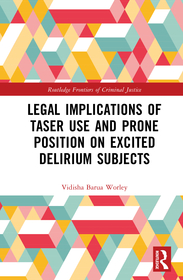
Legal Implications of Taser Use and Prone Position on Excited Delirium Subjects
Series: Routledge Frontiers of Criminal Justice;
- Publisher's listprice GBP 145.00
-
69 273 Ft (65 975 Ft + 5% VAT)
The price is estimated because at the time of ordering we do not know what conversion rates will apply to HUF / product currency when the book arrives. In case HUF is weaker, the price increases slightly, in case HUF is stronger, the price goes lower slightly.
- Discount 20% (cc. 13 855 Ft off)
- Discounted price 55 419 Ft (52 780 Ft + 5% VAT)
Subcribe now and take benefit of a favourable price.
Subscribe
69 273 Ft

Availability
Not yet published.
Why don't you give exact delivery time?
Delivery time is estimated on our previous experiences. We give estimations only, because we order from outside Hungary, and the delivery time mainly depends on how quickly the publisher supplies the book. Faster or slower deliveries both happen, but we do our best to supply as quickly as possible.
Product details:
- Edition number 1
- Publisher Routledge
- Date of Publication 17 November 2025
- ISBN 9781032703817
- Binding Hardback
- No. of pages176 pages
- Size 234x156 mm
- Language English 700
Categories
Short description:
Using case law, this book explores the controversial issues associated with excited or hyperactive delirium with severe agitation, including the appropriate use of tasers, and the inhumane practice of applying bodyweight pressure on subjects by placing them face down in the prone position, depriving them of the ability to breathe.
MoreLong description:
Using case law, this book explores the controversial issues associated with excited or hyperactive delirium with severe agitation, including the appropriate use of tasers, and the inhumane practice of applying bodyweight pressure on subjects by placing them face down in the prone position, depriving them of the ability to breathe.
This study alerts society to the urgent need to treat excited delirium as a medical emergency, rather than a crime scene where a multi-agency collaborative effort can de-escalate and manage these hyperthermic and paranoid individuals allowing them an opportunity to live. It also argues that the reaction of some U.S. states, that are prohibiting the term "excited delirium" and preventing officers from getting adequately trained, can have devastating results by increasing municipal liability for failure to train. It also fails those individuals undergoing serious mental health crises by way of excited delirium or seizures, who need to be served and protected as per the social contract theory.
Legal Implications of Taser Use and Prone Position on Excited Delirium Subjects will be of interest to legislators, attorneys, judges, police agencies, correctional facilities, and graduate-level students in criminal justice, law, and the social sciences.
"Legal Implications of Taser Use and Prone Position on Excited Delirium Subjects is an important addition to the scholarship on excessive force and police practices. Through detailed explanations and examples of excited delirium, Professor Vidisha Barua Worley illustrates the dangers of police practices that ignore the potential injury to arrestees and incarcerated people. Further, she examines the law as it relates to use of force, the potential for liability, and the legal hurdles that must be overcome to bring a lawsuit against the police when force is excessive. This book should be mandatory reading for police officers and those who train them, as well as legislators and judges who consider cases and legal restrictions related to use of force."
Justin Brooks, Professor of Practice, University of San Diego School of Law, Author of You Might Go to Prison, Even Though You’re Innocent.
"This book provides a timely and unflinching look at taser use, prone restraint, and the dubious legacy of excited delirium. Drawing on case law, medical insight, and real-world events, it challenges deeply entrenched practices with clarity and conviction. A must-read for policymakers."
Robert M. Worley, Professor of Criminal Justice, Lamar University.
Table of Contents:
1.Excited Delirium: A Myth or Reality. 2.The Controversial Taser: History, Legal Standards, and Guidelines. 3.Municipal Liability for Inappropriate Taser Use by Police Officers. 4.Taser Use by Police: Individual Officer Liability. 5.Taser Use on Pretrial Detainees. 6.Taser Use by Correctional Officers. 7.Taser’s Place in the Use-of-Force Continuum. 8.Excited Delirium, Prone Position, Hog-Tying, and Sudden Deaths. 9.Taser Use and Prone Position involving Excited Delirium Subjects. 10.Conclusion.
More








